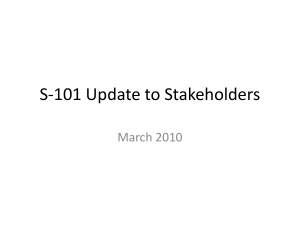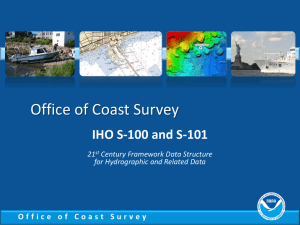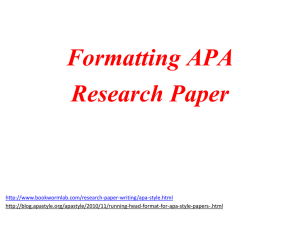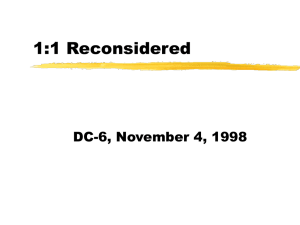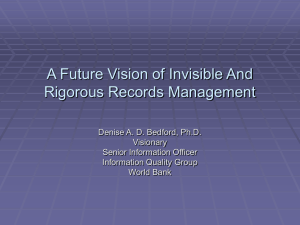S-101 Discussion Items
advertisement
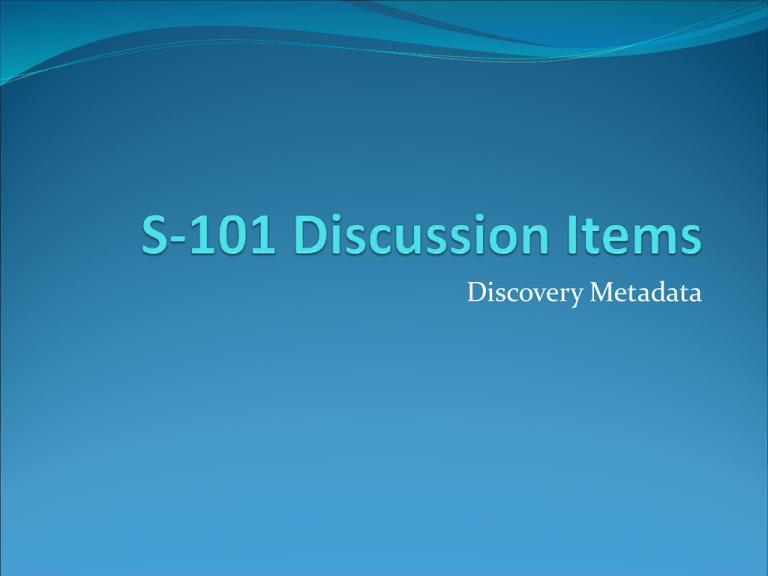
Discovery Metadata
Discovery Metadata
Currently Discovery Metadata is in two locations
Clause 12
Appendix
Contains similar information
Discovery Metadata
At the S-101 Stakeholders forum in March, it was
proposed that the following should also be considered
for discovery metadata:
A way to digitally check for the correct Feature
Catalogue and Portrayal Catalogue version
The ability to insert a corrected through field that would
inform the mariner and port state control which notice
to mariner the ENC was corrected to.
Proposed Discovery Metadata
Name
Cardinality
Value
Type
dataSetDiscoveryMetadata
-
-
metadataFileIdentifier
1
CharacterString
metadataPointOfContact
1
CI_ResponsibleParty
metadataDateStamp
metadataLanguage
1
1
Date
CharacterString
fileName
1
filePath
abstract
1
English
Remarks
-
All data sets conforming to S-101 PS
must use English language
CharacterString
Dataset file name
CharacterString
Full path from the exchange set root
directory
CharacterString
Short description of the area covered
by the dataset. For example, harbor
or port name, or area between two
named locations.
Proposed Discovery Metadata
purpose
1
{1} to {4}
CharacterString
specificUsage
1
{1} to {3}
CharacterString
editionNumber
1
CharacterString
updateNumber
1
CharacterString
updateApplicationDate
issueDate
productSpecificationEditi
onNumber
editionNumberS-100
producingAgency
dataProtection
0..1
1
1
Date
Date
S-101 product Specification
edition number
Edition of S-100 that the
product specification is based
on
1
1
1
1. New, 2. New Edition, 3.
Update, 4. Cancellation
Navigation purpose for
cataloging.
1. Ocean Passage, 2. Coastal, 3.
Port Entry
When a data set is initially
created, the edition number 1 is
assigned to it. The edition
number is increased by 1 at
each new edition.
Update number 0 is assigned to
a new data set.
{1} to {2}
CI_ResponsibleParty
CharacterString
1. Encrypted
2. Unprotected
Proposed Discovery Metadata
displayScale
{1} to {13}
1
double
Display scale must be
one of the 13
predefined in clause 3
– Spatial Resolution.
horizontalGeodeticDat
um
verticalDatum
soundingDatum
boundingBox
1
CharacterString
1
1
1
boundingPolygon
1
CharacterString
CharacterString
EX_GeographicBounding
Box
EX_BoundingPolygon
comment
cyclicRedundancyChec
k
layerId
0..1
1
CharacterString
NonNegativeInteger
1..*
Double
Identifies the relationship
to other layers that are
required to view the
complete data set.
Proposed Additional Fields
Name
Cardinality
Value
Type
featureCatalogueVersion
1
CharacterString
potrayalCatalogueVersion
1
CharacterString
updateCorrection
1
CharacterString
compressionFlag
1
algoritymMethod
sourceMedia
replacedData
1
1
1
dataReplacement
{1} to {2}
CharacterString
CharacterString
Remarks
Version of the S-101 Feature
Catalog that is in use with this
product specification.
Version of the S-101 Portrayal
Catalog that is in use with this
product specification
Notice to Mariner that the update
corrects the ENC through. This
would be used for port state
control to verify if the ENC is
up-to-date to notice to mariner
items.
1.
Yes
2.
No
ZIP, RAR, etc.
If a data file is cancelled is it
replaced by another data file
Cell name
Decisions for Consideration
Combine the content of both tables and place in
Clause 12 – metadata. This will make maintenance
easier
Review the proposed combined table to ensure that
what is currently documented is correct.
Review and approve the proposed additions to the
discovery metadata.
Propose additional fields for other types of metadata.
Discussion questions
Should TSMAD/DIPWG use the language in the IEC
66225 VDR specification in regards to support file
formats or should S-101 specify file types.
The IMO VDR states the following:
The software should be compatible with an operating system
available with commercial-off-the-shelf laptop computers and
where nonstandard or proprietary formats are used for storing
the data in the VDR, the software should convert the stored
data into open industry standard formats.
Discussion questions
If file types are specified, what formats should be
supported to make S-101 future proof?
Text
HTML
Audio
Video
What are the appropriate Audio and Video Formats?
Discussion Questions
In regards to support file management, should S-101
specify the implementation or just specify that
redundant files are deleted?
Discussion Questions
What information regarding support files needs to go
into the S-101 Discovery Metadata and S-101 Catalogue
file?
Background
At CSMWG 18 it was suggested that simplified
symbology has very little acceptance by the mariner at
the following options should be explored:
Option a) delete simplified symbols
Option b) delete simplified symbols and redefine
traditional symbols as coloured
Option c) declare simplified symbols as a voluntary
option
It was also suggested that Colour Palattes be
investigated also
Background
Additionally, NOAA also asked a question regarding
the display of M_QUAL and CATZOC
Background
Approximately every year NOAA conducts a user
survey that reaches the following groups:
•
AMERICAN PILOTS’ ASSOCIATION
1,200 MEMBERS
•
LOCAL PORT AUTHORITIES
40 LOCATIONS
•
MASTER AND MATES UNION
3,000 MEMBERS
•
US POWER SQUADRON
6,000 NAMED CHART USERS
•
US COAST GUARD AUXILIARY
3,000 NAMED CHART USERS
•
US COAST GUARD
1,400 NAMED CHART USERS
•
US NAVY
300 US SHIPS
•
AMERICAN WATERWAYS ORGANIZATION
NAMED OPERATORS
•
TUG AND BARGE COMPANIES
5,000 TUG BOATS
•
WORKBOAT COMPANIES
100 COMPANIES
•
LAKE CARRIERS ASSOCIATION
12 COMPANIES
NO
OP
IN
C
YE
AR
AN
D
CA
TZ
O
OL
SY
MB
RE
D
IO
N
100
90
80
70
60
50
40
30
20
10
0
ST
AR
Percentage(%)
Q.19 IF HYDROGRAPHIC SURVEY QUALITY AREAS COULD BE
PORTRAYED WITH THE STARRED SYMBOL OR THE YEAR OF THE
SURVEY AND THE ZONE OF CONFIDENCE (CATZOC).
WHICH OF THESE DO YOU PREFER?
NO
OP
IN
C
YE
AR
AN
D
CA
TZ
O
OL
SY
MB
RE
D
IO
N
100
90
80
70
60
50
40
30
20
10
0
ST
AR
Percentage(%)
Q.19 IF HYDROGRAPHIC SURVEY QUALITY AREAS COULD BE
PORTRAYED WITH THE STARRED SYMBOL OR THE YEAR OF THE
SURVEY AND THE ZONE OF CONFIDENCE (CATZOC).
WHICH OF THESE DO YOU PREFER?
Q.20 THERE ARE TWO TYPES OF ECDIS BUOY SYMBOLOGY –
TRADITIONAL AND SIMPLIFIED.
WHICH OF THESE DO YOU PREFER?
100
90
80
60
50
40
30
20
10
IO
N
OP
IN
NO
IED
PL
IF
SIM
ITI
O
NA
L
0
TR
AD
Percentage(%)
70
Q.20 THERE ARE TWO TYPES OF ECDIS BUOY SYMBOLOGY –
TRADITIONAL AND SIMPLIFIED.
WHICH OF THESE DO YOU PREFER?
100
90
80
60
50
40
30
20
10
IO
N
OP
IN
NO
IED
PL
IF
SIM
ITI
O
NA
L
0
TR
AD
Percentage(%)
70
Q.20B) HOW OFTEN DO YOU NAVIGATE AT NIGHT?
100
90
80
60
50
40
30
20
10
R
NE
VE
ES
TIM
SO
ME
LA
R
LY
0
RE
GU
Percentage(%)
70
Q.20A) WHICH ECDIS COLOR PALETTE DO YOU PREFER TO USE TO
NAVIGATE AT NIGHT?
100
PREFERENCE
90
80
60
50
40
30
20
10
DA
RK
DIU
M
ME
HT
0
LIG
Percentage(%)
70
Q.20A) WHICH ECDIS COLOR PALETTE DO YOU PREFER TO USE TO
NAVIGATE AT NIGHT?
RECREATIONAL
COMMERCIAL
100
90
80
60
50
40
30
20
10
DA
RK
DIU
M
ME
HT
0
LIG
Percentage(%)
70
Questions
Should Simplified Symbols be retained for S-101?
What is the benefit that S-101 will gain from reducing
the number of palattes?
Discussion Questions
How are the SI and SD datasets
related?
How does one ensure that an SI feature doesn’t exist in
an SD dataset or vice versa?
Discussion Questions
How will portrayal work?
Portrayal of SI and SD data together
Portrayal of one area that has SI and SD data adjacent to
an area that does not
Discussion Questions
How will distribution work?
Discussion Questions
How will updates work?
Sometimes an update will affect both SI and SD data –
are they packaged together and released simultaneously.
What happens if the end user only gets updates to the SI
data and not the SD data?
Discussion Questions
Would TSMAD consider multiple SI
cells by different themes?
Eg. An SI cell that contains only TSS information and a
SI cell that contains Aids to Navigation. These would
have to be related in some way. Can the same
association cover two different datasets?
Discussion Questions
Can the perceived benefits be
achieved in another way?
Consistency
ISSUE
In S-101
Comment
Compilation Scale
versus Display Scale
Yes
This is now set as spatial resolution and is
aligned with the standard RADAR ranges.
Need to consider changing CSCL to DSCL
(Display Scale) in the 8211
Consistency
ISSUE
In S-101
Comment
Guidance on the use
of M_CSCL
No
Does TSMAD need to mandate this
Consistency
ISSUE
In S-101
Comment
USAGE Band
Assignment
No
Usage bands are to be utilized for catalogue
purposes only and will not have a display scale
attached
Need to be harmonized in the discovery
metadata.
Consistency
ISSUE
In S-101
Comment
SCAMIN
Yes
SCAMIN that is now in S-65 will be
incorporated into S-101.
Recommendation for which section?
Consistency
ISSUE
In S-101
Data Inconsistencies No
across usage bands
Comment
How does TSMAD prevent this?
Consistency
ISSUE
In S-101
Comment
Contour Intervals
No
Mandate that contour intervals align with S-4*
*the United States(NOAA) objects
Consistency
ISSUE
In S-101
Comment
Inconsistent
Depiction and
misalignment of
data at cell
boundaries
No
Can S-101 fix this or is this encoding guidance?
Consistency
ISSUE
In S-101
Comment
Inconsistent
Depiction of Data
within a cell
No
Can S-101 fix this or is this encoding guidance?
Consistency
ISSUE
In S-101
Comment
Holes in Data
coverage
Yes
This should be resolved by the new display
scales.
Consistency
ISSUE
In S-101
Comment
Use of CATZOC in
M_QUAL
No
Possibly remove unassessed as an allowable
enumeration
Consistency
ISSUE
In S-101
Comment
Data Gaps and
overlaps
No
Need to establish rules for the handling of
gaps and overlaps.
Consistency
ISSUE
In S-101
Comment
Strengthening
Encoding Rules in
the UOC
Yes
Intention is to Mandate
Even more outstanding issue/questions that need to be
answered….
Aggregated Feature Types
S-101 Text and/or Issue
S-101 Questions
S-101
Section
S-101 Section
Header
4.3.4
Aggregated Feature Features with a use type of
At TSMAD 19 – It was pointed out that
Types
aggregated can have multiple
the highlighted portion is not correct.
What is correct for this section?
associations to other feature types.
They also are defined in the Feature
Catalogue.
All association or aggregation
relationships using collection features
are assumed to be peer to peer. The
“Relationship Indicator” [RIND]
subfield of these collection feature
records must be {3} = peer.
The use of these named aggregations
is described in the Data Capture and
Classification Guide.
ENC Data Set
S-101
Section
4.6
S-101 Section
Header
ENC Data Set
S-101 Text and/or Issue
S-101 Questions
An data set is a collection of Is this clause needed? As S-101
geo-referenced cells
is more specific in clause 11.3.1
Datasets?
containing geographic
features that are used to
fully describe the physical
marine environment for the
safe passage of vessels.
Cells
S-101
Section
4.7
S-101 Section
Header
Cells
S-101 Text and/or
Issue
Features with the
geometric properties of
point or line coincident
with the border of two
cells within the same
layer and with the same
display scale must be
part of only one cell.
S-101 Questions
What is the intent of the phrase
“within the same layer?” Can this
be removed?
Geometry
S-101
Section
4.9
S-101 Section Header
S-101 Text and/or Issue
S-101 Questions
Geometry
The following is currently
Is this also valid for soundings? If so,
stated in S-101:
TSMAD needs to explicitly state this.
The underlying geometry
of an will be constrained to
S-100 level 3a which
supports 0, 1 and 2
dimensional objects
(points, curves and
surfaces). The third
dimension is expressed as
an attribute of a feature.
Geometry
S-101
Section
S-101 Section Header
S-101 Text and/or Issue
S-101 Questions
4.9
Geometry
Despite the saving in data
volume offered by the use
of arcs/curves, the
disadvantages are such
(e.g. during updating,
generating
warnings/alarms) that they
must not be used for ENC.
How does this fit in with the use of
GM_Curve in the Figure and “curves”
in the previous issue above?
S-101 Work Item Leader
recommendation: Remove this
paragraph as S-101 is only to state
what is allowed, but need to explain
the use of GM_Curve.
Units of Measure
S-101
Section
5.4
S-101 Section
Header
Units of Measure
S-101 Text and/or Issue
S-101 Questions
Units to be used in an ENC:
Position: latitude and
longitude in decimal
degrees (converted into
integer values).
Depth: metres.
Height: metres.
Positional accuracy:
metres.
Distance: nautical miles or
metres.
Time: seconds.
Bearings: decimal
degrees.
Is this correct? What about angular
measure?
Positions
S-101
Section
S-101 Section
Header
S-101 Text and/or Issue
S-101 Questions
5.4.1
Positions
Positions are in WGS84 and
coordinates are held in the Data Set
Structure Information field under
coordinate multiplication factor for X,
Y and Z coordinate.
Coordinates must be held in
production systems at a resolution of
0.0000001 (10-7) and the coordinate
multiplication factor value should be
set to 10000000 (107) for all cells.
This is what is currently in S-101.
COMF has been divided into three
fields for X,Y and Z. The question is
where does S-101 specify the
resolution:
a. In the main body of the product
spec
b. In the 8211
In addition, is the spatial resolution the
same for X,Y, and Z?
Depths
S-101
Section
5.4.2
S-101
Section
Header
Depths
S-101 Text and/or Issue
S-101 Questions
Depths are converted from decimal
meters to integers by means of the 3D (Sounding) Multiplication Factor.
Soundings are never encoded with a
resolution greater than one
decimetre, so the value of sounding
multiplication factor must be 10.
For update cells, ‘Coordinate
Multiplication Factor’ [X], [Y] and the
‘3-D (Sounding) Multiplication Factor’
[Z] will not be present. In this case,
the values from the original base cell
should be used.
How do we state this for Depths as
the second paragraph is no longer a
valid statement. COMF has been split
into CMFX, CMFY, and CMFZ.
Data Maintenance
S-101
Section
8
S-101 Section Header
S-101 Text and/or Issue
Data Maintenance
Is what is in this section
enough, does TSMAD
need to add more. How
do S-58 validation checks
fit into S-101?
S-101 Questions
Implementation
S-101
Section
11.1
S-101 Section Header
S-101 Text and/or Issue
S-101 Questions
Implementation
The binary implementation Where is this actually set? Is this still
of S-101 must be used for needed? If so, is it needed in the
8211 or in the main part of the PS.
ENC. Therefore, the
“Implementation” [IMPL]
subfield of the “Catalogue
Directory” [CATD] field
must be set to “BIN” for the
data set files.
ENC Cell Naming
S-101
Section
11.3.3
S-101 Section Header
S-101 Text and/or Issue
S-101 Questions
ENC cell naming
What needs to go into the
cell name? Does TSMAD
need to limit it to 8
characters?
At the S-101 Stakeholders meeting
there was thought to including the
display scale in the name for
cataloguing purposes?
S-101
Section
S-101 Section
Header
S-101 Text and/or Issue
S-101 Questions
11.3.4
New Editions and
Updates
This section describes how the standard encoding defines updating methodologies for
cells. In order to ensure that feature type updates are incorporated into an ECDIS in
the correct sequence without any omission, the file extension and a number of other
parameters encoded in the data are used in the following way:
file extension
every new data set or new edition must have a .000
extension as per the translation from EDTN to the file
extension. For update cell files the extension is the value
of the UPDN field, ranging from .001 to .999. These
numbers must be used sequentially, without omission.
Number .001 is the first update after a new data set or a
new edition.
edition number
when a data set is initially created, the edition number 1 is
assigned to it. The edition number is increased by 1 at
each new edition.
update number
update number 0 is assigned to a new data set. The first
update cell file associated with this new data set must
have update number 1. The update number must be
increased by one for each consecutive update, until a new
edition is released. The new edition must have update
number 0. In the case of an update cell file the file
extension is the same as the update number.
update comment
comment for describing the change introduced by an
update.
issue date
date up to which the data producer has incorporated all
applicable changes.
In order to cancel a data set, an update cell file is created for which the edition
number must be set to 0. This message is only used to cancel a base cell file. Where
a cell is cancelled and its name is re used at a later date, the issue date must be
greater than the issue date of the cancelled cell.
Maintenance of support files is described in S-100.
In this section, a small workgroup
added the update comment field
that describes the change added
by the update.
There are also outstanding issues
on how to update support files that
need to be discussed.
